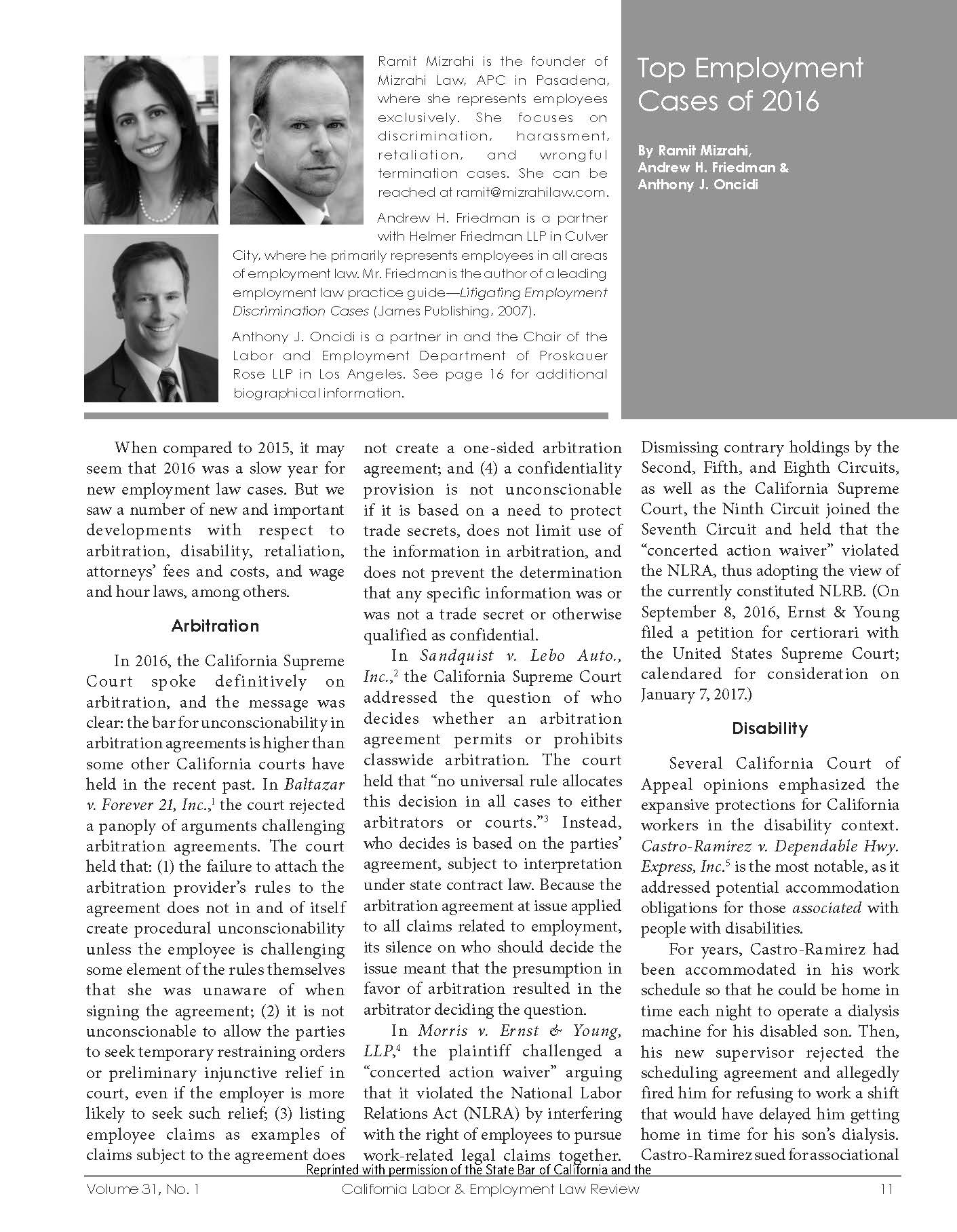-

Mizrahi Law is pleased to announce that founder Ramit Mizrahi has been selected for two highly prestigious lists:
- Super Lawyers® Up-and-Coming 100: Southern California Rising Stars 2017, and
- Super Lawyers® Up-and-Coming 50: Women Southern California Rising Stars 2017.

This is the third year that Super Lawyers has identified its most highly rated Rising Stars on top 50 and top 100 lists.
This also marks the fifth year that Ramit Mizrahi was selected a Super Lawyers® Southern California Rising Star. Only the top 2.5% of eligible attorneys in Southern California are selected as Super Lawyers Rising Stars, reflecting peer recognition of excellence in practice. Ms. Mizrahi was selected in the area of Employment Law (Plaintiff side), recognizing her commitment to helping employees.
Ms. Mizrahi’s selection as one of the top 100 Rising Stars and top 50 Rising Stars women–already a highly select group of attorneys–reflects that she is highly respected among her peers and is one of the top-rated attorneys in Southern California.
Ms. Mizrahi remains committed to serving as a tenacious advocate for her clients while working to build collegiality and community in the legal profession.
-

On June 20, 2017, Ramit Mizrahi will be speaking about mediating discrimination cases. The panel, titled “Mediating Employment Discrimination Cases in Changing Times,” will be presented at the Southern California Mediation Association’s 2017 Employment Mediation Institute.
Date and time: Tuesday, June 20, 2017, 6-9 p.m.
Description:
Have you found yourself thinking lately, “Wow, the world is changing at a rapid pace and I don’t know what will happen next?” Just as we have seen significant changes in the political and social realms, the field of employment law is rapidly evolving. State laws have taken on a greater importance, including with respect to protections for LGBT employees and undocumented employees. Additionally, long-standing rules have been construed in recent years to expand the scope of protected activity and protection against retaliation. There is much uncertainty ahead.
Please join our panel as they discuss the evolving employment law landscape, along with the practical implications and application for practitioners and mediators. Each of the panel members are at the forefront of handling cutting edge employment and labor law matters and will share their expertise, insights, and predictions for the world of employment law to come.
It promises to be a great evening!Location: Pepperdine University West LA Campus, Pepperdine University Plaza, 6100 Center Drive, Los Angeles, CA 90045.
Tickets are available here.
-

On March 8, 2017, Ramit Mizrahi will be speaking about the summary judgment cases that every California employment lawyer should know. The panel, titled “The 50 Cases You Need to Know to Obtain and Oppose Summary Judgment,” will be part of the Los Angeles County Bar Association’s 37th Annual Labor & Employment Law Symposium.
Date and time: Wednesday, March 8, 2017, 10-11 a.m.
Description: Learn the top 50 cases you need to know in preparing and opposing motions for summary adjudication and/or summary judgment in major areas of employment law, including claims of harassment and discrimination based on race, gender, age, disability and claims of retaliation.
Location: Millennium Biltmore Hotel Los Angeles, 506 S Grand Ave, Los Angeles, CA
Tickets are available here.
-

On March 1, 2017, Ramit Mizrahi will be speaking about returning to work from long medical leaves. The panel will be part of the Employment Round Table of Southern California’s 2017 Legal Update and Important Legal Issues seminar. The panel is titled “‘I’m Finally Ready!’: When Employees Return to Work After Long Medical Leaves.” Ms. Mizrahi will be speaking alongside Tina Walker (Regional Administrator, Department of Fair Employment and Housing) and Elisabeth Lilly (Senior Counsel, Northrop Grumman Corp.).
Date and time: Wednesday, March 1, 2017, 10 a.m.
Description: The California Family Rights Act and the ADA provide employees with a bridge back to work – or is it more like a highway? Employees on medical leaves are often released to return to work long after they have exceeded their job protections under federal and state law. These employees may have medical limitations or need work accommodations. Their old job may or may not be available, and they may or may not be able to perform essential job functions. Our panel will discuss the issues associated with such returns to work. Tina Walker (Regional Administrator, DFEH Los Angeles Regional Office) will speak from a government perspective, Elisabeth Lilly, Esq. (Senior Counsel, Northrop Grumman Corp.) from that of the employer, and Ramit Mizrahi, Esq. (Founder, Mizrahi Law, APC) from that of returning employees.
Location: Loyola Law School Fritz B. Burns Lounge, 919 Albany St., Los Angeles, CA 90015
Tickets are available here.
-
This month’s issue of the California Labor & Employment Law Review features an article authored by Ramit Mizrahi, Andrew Friedman, and Tony Oncidi. The Law Review is an official publication of the State Bar of California’s Labor & Employment Law Section. The article—”The Top Employment Cases of 2016″—highlights the most important California and Supreme Court employment cases from last year. Click on the below image to read the article in full.

-

Happy holidays and happy new year!
2016 has been a tumultuous year for all of us. But California continues to serve as a shining beacon, leading the way, including with legislation that protects workers. Here are five new laws worth celebrating as we welcome the new year.
1. Minimum Wage Increase to $15/Hour by 2023 — SB-3
Over the past few years, the California State Legislature has steadily increased the minimum wage, a move that helps stem the rising income inequality in our society. SB-3 increases the minimum wage for all employees to $15 an hour by 2023, and ties future increases to inflation. The schedule (subject to certain conditions) will be. . .
-

Given the election outcome, there is much uncertainty about the what the future holds for our country. Workers have many reasons to be concerned, particularly given that our President-elect will likely appoint and nominate people hostile to workers’ rights and civil rights to government positions, including to the Equal Employment Opportunity Commission, the National Labor Relations Board, and the Supreme Court.
Fortunately, we in California are to some extent shielded from changes in federal laws in situations where there are California laws in effect that offer similar or broader protections. To give some examples:
- A California employee can usually sue for discrimination, harassment, or retaliation based on sex, race, and certain other protected categories under either the California Fair Employment and Housing Act (“FEHA”) or under Title VII of the Civil Rights Act of 1964 (“Title VII”). The FEHA covers employers with five or more employees for discrimination and retaliation, and one or more employees for harassment, and also allows individual harassers to be sued personally. Title VII applies to employers with fifteen or more employees and does not allow for individual liability. Title VII also contains caps on compensatory and punitive damages based on the size of the employer, while the FEHA has no such limitations.
- The FEHA explicitly prohibits discrimination based on “gender, gender identity, gender expression” and “sexual orientation,” while Title VII does not. The EEOC and a number of federal courts have taken the (logical and just) position that sexual orientation discrimination is a subset of sex discrimination and therefore prohibited under Title VII (as is discrimination against LGBT individuals in general), but there is a risk that with a change in the composition of the federal courts, we could regress in interpretations of federal law. Regardless, LGBT workers in California will remain protected.
- The FEHA and the Americans with Disabilities Act (“ADA”) offer similar protections with respect to disability discrimination. The FEHA is more protective of disabled employees and explicitly states that the ADA serves only as a “floor.”
- The California Family Rights Act (“CFRA”) and the Family and Medical Leave Act (“FMLA”) are two leave laws that have significant overlap in their coverage and protections. Again, CFRA offers more protections to California employees, particularly pregnant women who also take pregnancy disability leave.
- California’s Labor Code contains a number of protections regarding minimum wages, overtime pay, recordkeeping, and other employee protections, as does the Fair Labor Standards Act (“FLSA”). The California laws tend to be more protective (for example, providing that most non-exempt employees receive overtime for for all hours over 8 worked in a day, not just for all hours over 40 per week, and also requiring that employees receive meal and rest breaks).
- California has a number of laws that protect whistleblowers, including Labor Code section 1102.5 (a broad statute that protects all types of whistleblowing), Labor Code section 6310 (protecting employees who complain about workplace health and safety issues), and Health and Safety Code section 1278.5 (protecting employees who complain about patient health and safety issues). There are some overlaps with federal whistleblower laws.
As the previous paragraph demonstrates, our laws tend to offers greater protections and additional remedies as compared to federal employment laws. For that reason, most California employees choose to sue under the California laws when possible. In addition, asserting California (and not federal) claims allows employees to file and usually to keep their cases in state courts. There, an employee need only convince nine out of twelve jurors to find in his favor in order to win his case, in contrast to the requirement in federal court that the jury find for him unanimously. Judges in state court are also less likely to grant summary judgment and dismiss employees’ cases, and tend to give lawyers more time to try their cases.
We are fortunate to live where we do. The newly enacted Labor Code section 925 will ensure that employers cannot strip California employees of their substantive rights or force them to litigate/arbitrate their claims in out-of-state forums. Even if the courts and the nominees/appointees of the new administration will interpret federal laws in a manner that is less favorable to employees, California workers can continue to pursue their state claims, and can continue to push for even more progress in California.
-

Most people know that employers are required to provide reasonable accommodations to employees with disabilities. But they are also required to accommodate those whom they perceive or regard as disabled. A new California case, Moore v. Regents of the Univ. of California, 248 Cal.App.4th 216 (2016) affirms these obligations and has terrific language with respect to employee accommodation and leave rights.
Background
Deborah Moore worked as UCSD’s Director of Marketing. In mid-2010, a new person took over as her supervisor and sought to restructure the department. A couple of months later, Moore was diagnosed with idiopathic cardiomyopathy, a condition affecting the heart muscles that can lead to heart failure. Her doctor ordered her to wear a heart monitor and external defibrillator for several weeks. Moore told her supervisor about her heart condition and needs, and assured the supervisor that “there was nothing to worry about, that it would take care of itself” and that she would be able to do her job, “no problem.” Her supervisor, however, was concerned—unilaterally deciding to “lighten [Moore’s] load to get rid of some of the stress.” The supervisor asked HR what to do in the case of a medical event and admitted that she asked how to handle Moore as a liability. After that, the relationship between Moore and her supervisor soured, with Moore believing that the supervisor was unfairly criticizing her, yelling at her, taking away her duties, and demoting her because of her heart condition. Some time later, Moore advised that she would need some time off to get a pacemaker put in. The supervisor then eliminated Moore’s position and terminated her—even though Moore had more seniority than a colleague of hers and that this was a violation of policy. In the following six-month period, new employees were hired, including for roles that Moore was well-qualified to perform.
Moore’s Complaint and History of Her Case
Moore sued, alleging causes of action under the Fair Employment and Housing Act (FEHA) for disability discrimination, failure to accommodate, failure to engage in the interactive process, and retaliation, as well as causes of action for interference and retaliation under the California Family Rights Act (CFRA). Note that Moore’s disability causes of action were based on perceived disability, rather than actual disability.
The Regents moved for summary judgment, which the trial court granted. Moore appealed.
The Court of Appeal’s Decision
The Court of Appeal held that summary judgment was improperly granted with respect to all but one of Moore’s causes of action. In doing so, the court followed the holding of Gelfo v. Lockheed Martin Corp., 140 Cal.App.4th 34 (2006), which holds that employers have an obligation to provide reasonable accommodations and engage in the interactive process with those that they regard as disabled. It quoted the rationale laid out in Gelfo:
“An employer who in unable or unwilling to shed his or her stereotypic assumptions based on a faulty or prejudiced perception of an employees abilities must be prepared to accommodate the artificial limitations created by his or her own faulty perceptions.”
-

California workers have yet another reason to rejoice. This month, Governor Brown signed into law a bill that prohibits choice of law and choice of forum provisions in employment contracts.
Why is this law so important?
California has some of the strongest employee protections in the nation. However, some employers have sought to strip away these protections and to deter employees from asserting legal claims through the use of choice of law and choice of forum provisions. These provisions are often buried in arbitration agreements that are presented to employees or job applicants on a “take it or leave it” basis.
A choice of law provision is a term in a contract or agreement that requires that any dispute be governed by the laws of a particular jurisdiction. For example, if a California employee’s employment contract or arbitration agreement has a choice of law provision stating that the contract will be governed by Texas law, Texas law will likely trump California law for claims brought under the contract—even if this reduces or limits the employee’s claims or recovery. Choice of law provisions can make it difficult for employees to even understand their legal rights, as they are likely unfamiliar with the out-of-state laws that would apply to their claims.
A choice of forum provision determines where an employee can assert his or her claim. For example, if there is a choice of forum provision in an employment agreement that requires arbitration in Delaware, that would prevent an employee from being able to file a lawsuit in a California court. Instead, the employee would be forced to pursue their case in arbitration in Delaware. Such a provision serves to deter an employee from bringing forward legal claims because the employee would need to find a lawyer to take on the case in another state, would likely be unfamiliar with the out-of-state forum, would need to travel to the forum, and would have a case that is far more expensive to litigate because the witnesses are not in the same place as the forum.
New Labor Code section 925
This month, Governor brown signed a bill by Senator Bob Wieckowski (D-Fremont)—SB 1241—that creates a new section of the Labor Code:
-

Vergara v. State of California, No. B258589, 2016 WL 4443590 (Cal. Ct. App. Aug. 22, 2016)
Nine California public school students sued the State of California and state officials alleging that portions of the California Education Code that govern teacher tenure, dismissals, and layoffs were unconstitutional and denied them equal protection. Over the course of an eight-week trial, the evidence reflected a number of significant problems: Tenure decisions were required to be made so quickly (within two years) that principals had only about 16 months to begin making their reelection decisions—far too little time to adequately assess performance. Dismissals of teachers were so expensive and time-consuming that in a ten-year span only two teachers per year on average out of a total K-12 teacher population of 277,000 were dismissed. “Last in, first out” rules regarding layoffs required that teachers be let go in reverse order of seniority, such that effective teachers were laid off before ineffective ones with more seniority. Extensive evidence was presented about how administrators engaged in a “dance of the lemons”—shuffling grossly ineffective teachers around from school to school, with them often landing in schools serving poor and minority students.
After the trial, the trial court issued a ruling declaring five sections of the Education Code unconstitutional. The court found that competent teachers are a critical component of a child’s success in their educational experience, and that grossly ineffective teachers undermine a child’s success. The court determined that the evidence at trial was compelling and “shocks the conscience.” The court concluded that the challenged policies were unconstitutional, determining that substantial evidence showed that they disproportionately affected poor and/or minority students. Defendants appealed.
The Court of Appeal Upheld the Laws
The Court of Appeal reversed, holding that the statutes did not inevitably cause low-income and minority students to be disproportionately assigned to grossly ineffective teachers in violation of equal protection, nor was there an identifiable class under equal protection analysis for the “unlucky subset” of students in the general population assigned to grossly ineffective teachers. As the court reasoned . . .
Mizrahi Law Blog
Mizrahi Law, APC
- 35 N Lake Ave, Ste 710, Pasadena, California 91101
- dates@mizrahilaw.com
- (626) 380-9000
Client Testimonial
“I highly recommend Ramit Mizrahi. She has a winning combination of knowledge, passion, strategy, and empathy. She takes action and communicates updates promptly. Her professionalism is hard to beat. I’d give her 10 stars if I could!”
Latest News
- Ramit Mizrahi has been recognized as one of the Top 100 Super Lawyers and Top 50 Women Super Lawyers in Southern California in 2023.
- Ms. Mizrahi is being recognized in the 2023 Edition of The Best Lawyers in America©, published by U.S. News & World Report and by Best Lawyers.
- Ms. Mizrahi has been selected as a Top Attorney by Pasadena Magazine for 2023.
- Ms. Mizrahi is serving as Chair of the Pasadena Bar Association Labor and Employment Section.
